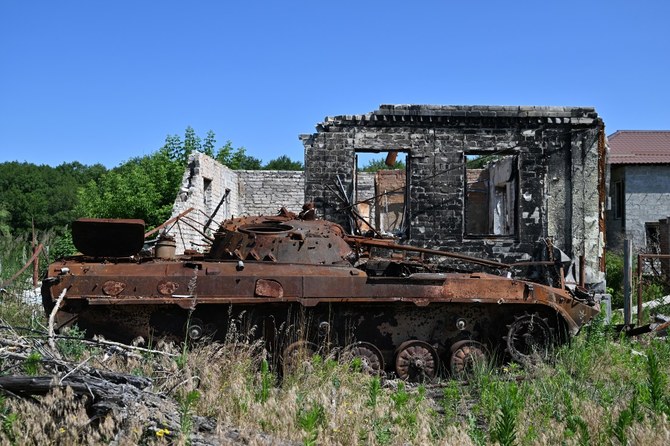
- ARAB NEWS
- 18 Jul 2025

Saudi Arabia is emerging as a key peacemaker, not only in the Middle East but also on the global stage. The Kingdom’s overall mission and its unique position make it a perfect candidate to play such a critical role in the region and beyond.
On the global stage, Saudi Arabia is currently leading peace talks between Ukraine and Russia. The Kingdom will reportedly host a peace summit in Jeddah this weekend. Jake Sullivan, the US national security adviser, is expected to attend. More than 30 countries, including India, Brazil, Indonesia, Egypt, Mexico, Chile and Zambia, have been invited.
The conflict between Russia and Ukraine, which has been ongoing for more than a year, has caused significant damage and many casualties. “We expect attendees will discuss the principles for peace and how we can achieve a just and durable peace in Ukraine,” a US official said. And Andriy Yermak, the head of Ukraine’s presidential office, posted on social media: “We are now working hard to involve as many partners as possible from the West and the Global South in the negotiations in (Saudi Arabia).”
It is worth noting that Saudi Arabia has been involved in a number of peacemaking and mediation efforts involving Russia and Ukraine. For instance, the Kingdom, alongside the UAE, in December played a major intermediary role in facilitating an exchange of prisoners between Moscow and the US. In a joint statement, the Saudi Ministry of Foreign Affairs and its UAE counterpart announced that their efforts had led to the release and exchange of two prisoners — American basketball star Brittney Griner and Russian arms dealer Viktor Bout. The ministries said the success of their mediation efforts was a reflection of the “mutual and solid friendship” between their two countries and the US and Russia.
Saudi Arabia has been involved in a number of peacemaking and mediation efforts involving Russia and Ukraine
Dr. Majid Rafizadeh
This again reveals Saudi Arabia’s important and constructive mission to transform its diplomatic role in the region and on the international stage.
When it comes to the region, Saudi Arabia has prioritized its peacemaking mission over deploying hard power. For example, the Kingdom has restored diplomatic ties with war-torn Syria and made the important decision to resume the work of its diplomatic mission in Damascus. Syrian President Bashar Assad met with Saudi Foreign Minister Prince Faisal bin Farhan in April after the latter’s Syrian counterpart had visited Saudi Arabia. The Syrian president and Prince Faisal discussed steps to “achieve a comprehensive political settlement that … contributes to Syria’s return to the Arab fold,” according to the Saudi Foreign Ministry.
In another development, Saudi Arabia has decided to pursue a peacemaking process with the Iranian government. Although China brokered the agreement between the two countries that was announced in March, the key role that the Kingdom played should not be disregarded.
Jon Alterman, of the Center for Strategic and International Studies’ Middle East Program, pointed to this fact when writing: “By paying so much attention to China, Americans risk missing the most important part of this agreement: the changing regional role of Saudi Arabia. A week of smoothly integrated diplomacy not only showed Saudi Arabia to be a skillful diplomatic actor, but also a creative one. The popular image of Saudi Arabia in the US is that of a largely passive consumer of US-provided security. With the agreement, Saudi Arabia cast off the passivity of many decades and demonstrated it is a diplomatic force to be reckoned with.”
When it comes to the region, Saudi Arabia has prioritized its peacemaking mission over deploying hard power
Dr. Majid Rafizadeh
Playing the role of peacemaker is not limited to resolving tensions or conflicts between states and governments. Bridging gaps between communities and religions is vital too. In other words, promoting interfaith dialogue is important when it comes to reducing tensions and misunderstandings, whether in the Middle East or other parts of the world. The more countries in the Middle East that pursue this goal, the more peace the region will experience.
In the past few years, Crown Prince Mohammed bin Salman has put significant emphasis on interfaith dialogue and has played a key role in advancing and promoting this critical mission. Under his leadership, Saudi Arabia has been reaching out to other religious groups and faiths. In 2020, the Kingdom presided over a global interfaith forum, in which Muslim clerics, Jewish rabbis, Christian priests and other religious leaders took part. And a multifaith conference was held in Riyadh in 2022. It was titled the “Forum on Common Values Among Religious Followers.” The conference was the first of its kind and about 100 religious leaders, including more than 15 rabbis, attended.
As Mehran Kamrava, professor of government at Georgetown University in Qatar and director of the Iranian Studies Unit at the Arab Center for Research and Policy Studies, said: “Successful mediation requires several key ingredients, chief among which are flexibility, in-depth knowledge of the issues at hand, and leverage over the disputants … In a region often marked by tensions and international crises, mediation efforts similar to those undertaken by Saudi Arabia offer a positive approach for de-escalating, if not altogether resolving, regional conflicts.”
In a nutshell, due to its constructive and long-term vision, Saudi Arabia is emerging as a key peacemaker in the region and on the global stage. The Kingdom possesses all the qualities required to play such a critical role.
• Dr. Majid Rafizadeh is a Harvard-educated Iranian-American political scientist. Twitter: @Dr_Rafizadeh